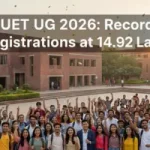Education System has gone through many changes since its inception based on the contemporary needs in the past, the development of specific personality traits in the students, and changing technologies. If we see, in the ancient time Gurukuls were organized by the Gurus to impart the knowledge of Vedas into students. In the modern era, these Gurukuls turned into Schools that are located locally and well equipped with all necessary facilities and technologies. Within the school education system, we have seen many changes based on socio-cultural changes and new technologies. From the past few years, smart classes emerged as a new technology-based learning method in which teachers use digital technology to teach students within the classroom.
Today digital education furthered to a more advanced level where students need not visit the school or any educational institution to gain knowledge. They can get the required knowledge in the comfort of their home. In easy terms, digital education is the innovative use of digital tools and technologies during teaching and learning. It is often referred to as e-learning. Though the digital education trend started in institutions that are providing higher education but now, it is also emerging as the only option for elementary education post-COVID 19.
Must Read: How Online Test Series Raises Rank In NEET Exam?
Digital Education: Need Of The Hour
Today, Digital education is making its way into the education system and is taking the place of traditional classroom training. The growing pace of technology and its popularity especially among youngsters is driving the educational ecosystem. Let’s look little deep into the need for digital education or online classes in the contemporary scenario:
Accessibility: The COVID 19 pandemic allowed us to think about the option to continue the learning process while keeping the social distance. Digital Education is the solution to so-called worries that effective education is not possible outside the classroom. By opting online class schools can provide access to virtual books or library at no cost or nominal costs to all the students and teachers. This will reduce the burden of heavy bags for students and the burden of expenses for parents. It will greatly help in reaching the rural areas of the country. Rural students can also get the benefit of quality education which otherwise is not possible in their village school.
Online platform like Champstreet covers complete maths and science courses of class 6,7,8,9,10 through videos, text, concept maps, NCERT solutions, Practice questions, and model test papers.
Technical Tools: Though digital education is an advanced version in the education system yet it is very affordable. The one with the computer system/laptop or smartphone with internet can start his/her online learning. As per the latest official data, 50% of the Indian population has access to the internet. Hence, the digital reach is not an issue at all. We just need to implement it in the right direction with an effective online learning strategy.
Learning at Own Pace: In countries like India where the teacher-student ratio is growing so fast which is considered as a disadvantage of classroom education, online classes can prove to be a boon. Online classes provide the opportunity for students to learn at their comfort. Students can record the online lecture and listen to it again and again for better understanding which otherwise is not possible in school classrooms. This helps students to grow naturally without external pressure.
Keeping in mind about the quality education for students’ specially aspiring engineers and doctors MTG has come up with the range of digital resources. These resources are very well planned and curated by experts after detailed analysis of the latest pattern of the exam and need of the students.
MTG’s Online material of NEET & JEE available
Global Exposure: There are no boundaries set for education. One has all the right to gain knowledge from the countries across the globe. However, it is quite expensive and hard in real-time but virtual classrooms provide us the opportunity to learn anything about any region of the world while sitting in the remotest area. E-learning provides global exposure to students to learn from the best mentors and with high-quality resources in the world.
In recent times we have seen the growing popularity of Olympiad Exams which are organized across states and some other parts of the globe. It not only tests knowledge but also helps in developing cognitive, aptitude, and reasoning skills in the student. Olympiads provide the necessary exposure to the students which helps them to grow overall. Olympiads prepare a student not only for academic exams but for future competitive exams. You are fortunate to have access to digital resources to prepare for the Olympiad at home with digital products of the SOF Olympiad Trainer.
Learning Technology: The growing pace of technologies and the role of digital learning in education bring our attention to gaining a fair understanding of this technology. This allows us to learn new techniques for the further advancement of our education system. It also provides an opportunity to give a push to students, teachers, and parents to know the technology for its better utilization.
Digital Learning: Road Ahead
COVID 19 pandemic makes us understand that digital education is the need of the hour. Now, we should focus on building a strong and effective education system backed with digital learning so that the learning process would never stop even in hard times. Let’s discuss what we can do for it:
Strategy: First and foremost we need to develop an effective strategy based on the current e-learning status in our country. We have to create a step by a step action plan for digital transformation in our education system.
Training Skills: Government and educational institutes need to work on training teachers with new technology skills for effective use of the e-learning method. When we have skilled teachers and mentors learning process will become interesting and it results in quality education.
Mobile learning: As discussed above around 50% of the Indian population has access to the internet hence; mobile learning can be a breakthrough in digital education. The government and education institutions should plan the strategy keeping in mind the mobile users in the country.
In the end, we cannot deny the fact that digital learning is the only way forward to the post-pandemic era. Conventional learning is history now and we should look forward to greater digital transformation in our education system.






























